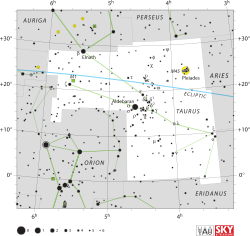|
| 32 Tauri |  | Observationsdata
Epok: J2000.0 |
|---|
| Stjärnbild | Oxen |
|---|
| Rektascension | 03t 56m 52,07680s[1] |
|---|
| Deklination | +22° 28′ 40,6993″[2] |
|---|
Skenbar magnitud ( ) ) | 5,64 (V)[3] |
|---|
| Stjärntyp |
|---|
| Spektraltyp | F2 IV[4] |
|---|
| U–B | +0,00[3] |
|---|
| B–V | +0,34[5] |
|---|
| Astrometri |
|---|
Radialhastighet ( ) ) | +31,90 ± 0,5[6] km/s |
|---|
| Egenrörelse (µ) | RA: +69,82 ± 0,51[1] mas/år
Dek.: -114,36 ± 0,45[1] mas/år |
|---|
Parallax ( ) ) | 23,62 ± 0,39[1] |
|---|
| Avstånd | 138 ± 2 lå (42,3 ± 0,7 pc) |
|---|
Absolut magnitud ( ) ) | +2,42[7] |
|---|
| Detaljer |
|---|
| Massa | 1,47[8] M☉ |
|---|
| Radie | 2,01[5] R☉ |
|---|
| Luminositet | 8[9] L☉ |
|---|
| Temperatur | 6 857[9] K |
|---|
| Metallicitet | -0,27 (Fe/H)[8] dex |
|---|
| Vinkelhastighet | 22[10]km/s |
|---|
| Ålder | 2,1[8] miljoner år |
|---|
| Andra beteckningar |
|---|
| GCRV 2261, IRAS 03539+2220, SKY# 6034, AG+22 368, GEN# +1.00024740, 2MASS J03565206+2228410, TD1 2671, AKARI-IRC-V1 J0356521+222839, GSC 01261-01718, PLX 867, TYC 1261-1718-1, BD+22 605, HD 24740, PLX 867.00, UBV M 9829, EPIC 210968459, HIC 18471, PMC 90-93 1222, uvby98 100024740, FK5 2283, HIP 18471, PPM 93095, YPAC 231, GC 4744, HR 1218, SAO 76339, YZ 22 1258 [11] |
32 Tauri, som är stjärnans Flamsteed-beteckning, är en ensam stjärna[12] belägen i den östra delen av stjärnbilden Oxen. Den har en skenbar magnitud på ca 5,64[3] och är svagt synlig för blotta ögat där ljusföroreningar ej förekommer. Baserat på parallaxmätning inom Hipparcosuppdraget på ca 23,6[1] mas, beräknas den befinna sig på ett avstånd på ca 138 ljusår (ca 42 parsek) från solen. Den rör sig bort från solen med en heliocentrisk radialhastighet av ca 32 km/s.[6] Med stjärnans position nära ekliptikan är den föremål för ockultationer med månen.[13][14]
Egenskaper
32 Tauri är en gul till vit[15] underjättestjärna av spektralklass F2 IV.[4] Den har en massa som är ca 1,5[8] solmassor, en radie som är ca 2[5] solradier och utsänder ca 8[9] gånger mera energi än solen från dess fotosfär vid en effektiv temperatur på ca 6 900 K.[9] Stjärnans underskott av element tyngre än väte och helium är lägre än hos solen.[8]
Referenser
- Den här artikeln är helt eller delvis baserad på material från engelskspråkiga Wikipedia, 32 Tauri, 25 maj 2020.
Noter
- ^ [a b c d e] van Leeuwen, F. (2007), "Validation of the new Hipparcos reduction", Astronomy and Astrophysics, 474 (2): 653–664, arXiv:0708.1752, Bibcode:2007A&A...474..653V, doi:10.1051/0004-6361:20078357.
- ^ ”Basic data: * 32 Tau -- Star” (på engelska). Centre de Données astronomiques de Strasbourg. http://simbad.u-strasbg.fr/simbad/sim-basic?Ident=32+Tau. Läst 31 oktober 2017.
- ^ [a b c] Mermilliod, J.-C. (1986), "Compilation of Eggen's UBV data, transformed to UBV (unpublished)", Catalogue of Eggen's UBV Data. SIMBAD, Bibcode:1986EgUBV........0M.
- ^ [a b] Cowley, Anne; Fraquelli, Dorothy (February 1974), "MK Spectral Types for Some Bright F Stars", Publications of the Astronomical Society of the Pacific, 86 (509): 70, Bibcode:1974PASP...86...70C, doi:10.1086/129562.
- ^ [a b c] https://www.universeguide.com/star/18471/32tauri
. Hämtad 2020-05-25.
- ^ [a b] Gontcharov, G. A. (November 2006), "Pulkovo Compilation of Radial Velocities for 35,495 Hipparcos stars in a common system", Astronomy Letters, 32 (11): 759–771, arXiv:1606.08053, Bibcode:2006AstL...32..759G, doi:10.1134/S1063773706110065.
- ^ Paunzen, E.; et al. (July 2014), "Investigating the possible connection between λ Bootis stars and intermediate Population II type stars", Astronomy & Astrophysics, 567: 8, arXiv:1406.3936, Bibcode:2014A&A...567A..67P, doi:10.1051/0004-6361/201423817, A67.
- ^ [a b c d e] Casagrande, L.; et al. (2011), "New constraints on the chemical evolution of the solar neighbourhood and Galactic disc(s). Improved astrophysical parameters for the Geneva-Copenhagen Survey", Astronomy & Astrophysics, 530 (A138): 21, arXiv:1103.4651, Bibcode:2011A&A...530A.138C, doi:10.1051/0004-6361/201016276.
- ^ [a b c d] McDonald, I.; et al. (2012), "Fundamental Parameters and Infrared Excesses of Hipparcos Stars", Monthly Notices of the Royal Astronomical Society, 427 (1): 343–57, arXiv:1208.2037, Bibcode:2012MNRAS.427..343M, doi:10.1111/j.1365-2966.2012.21873.x.
- ^ Royer, F.; Zorec, J.; Gómez, A. E. (February 2007), "Rotational velocities of A-type stars. III. Velocity distributions", Astronomy and Astrophysics, 463 (2): 671–682, arXiv:astro-ph/0610785, Bibcode:2007A&A...463..671R, doi:10.1051/0004-6361:20065224.
- ^ "32 Tau". SIMBAD. Centre de données astronomiques de Strasbourg. Hämtad 2015-11-05.
- ^ Eggleton, P. P.; Tokovinin, A. A. (September 2008), "A catalogue of multiplicity among bright stellar systems", Monthly Notices of the Royal Astronomical Society, 389 (2): 869–879, arXiv:0806.2878, Bibcode:2008MNRAS.389..869E, doi:10.1111/j.1365-2966.2008.13596.x.
- ^ T. D. Barry, J. A. Blatchford (maj 1931). ”Occultations of stars by the moon” (på engelska). Astronomical Journal 41 (956): sid. 80. doi:10.1086/105033.
- ^ Barry, T. D.; Blatchford, J. A. (May 1931), "Occultations of stars by the moon", Astronomical Journal, 41 (956): 80, Bibcode:1931AJ.....41...80B, doi:10.1086/105033.
- ^ "The Colour of Stars", Australia Telescope, Outreach and Education, Commonwealth Scientific and Industrial Research Organisation, December 21, 2004, archived from the original on March 10, 2012, hämtad 2012-01-16.
Externa länkar
|





